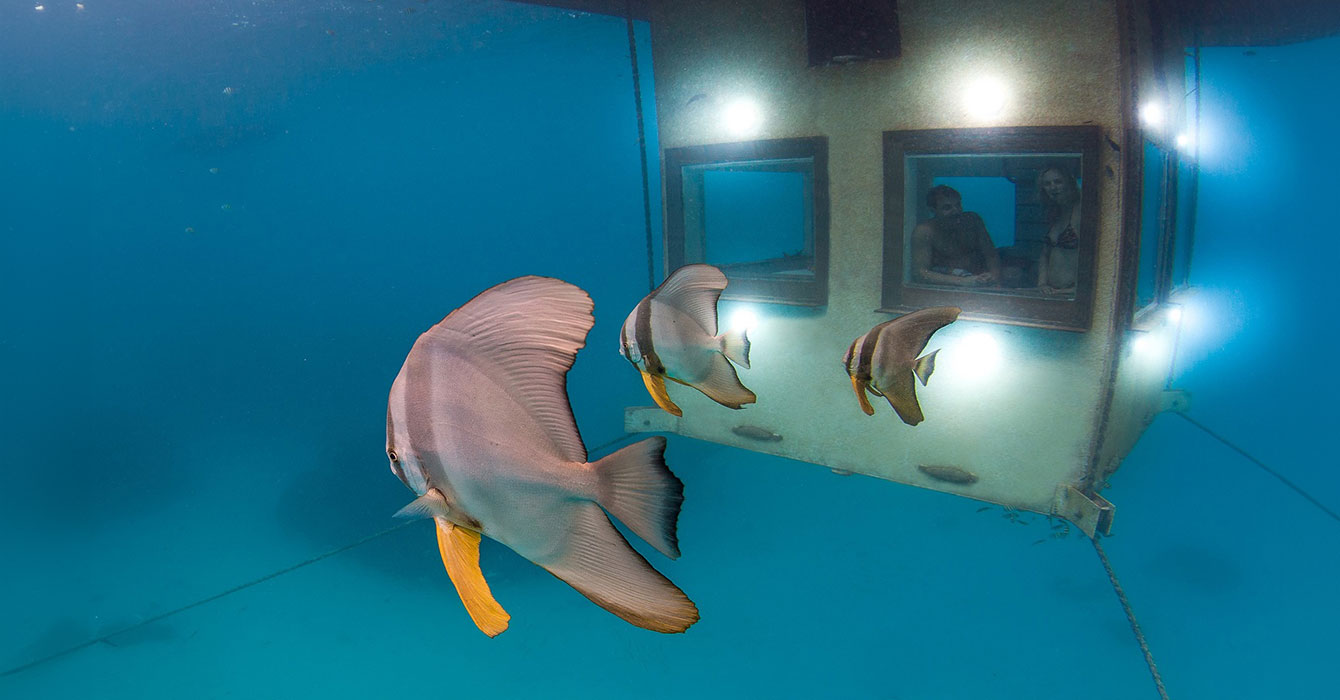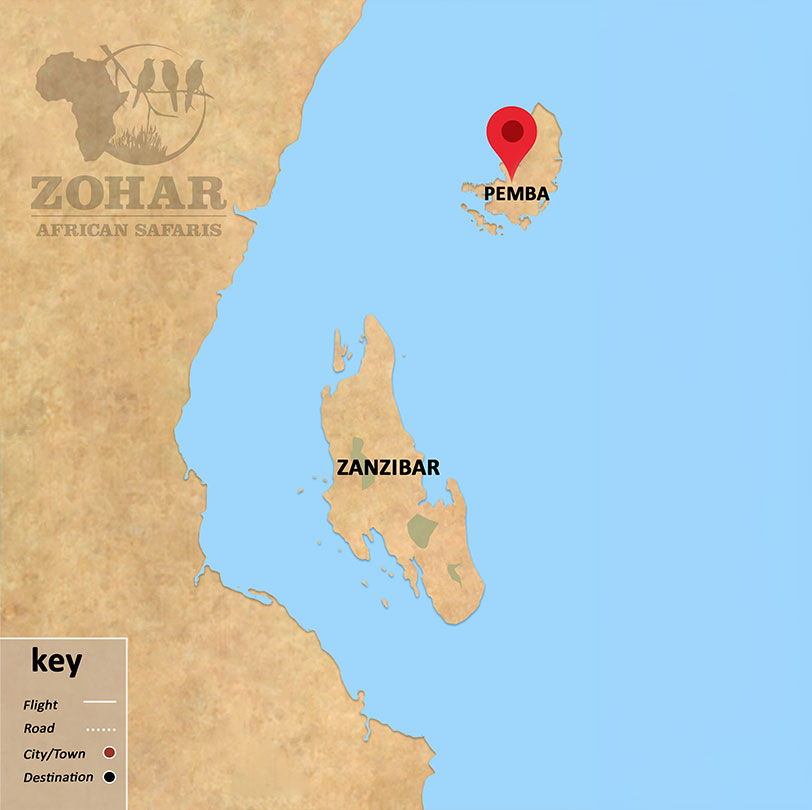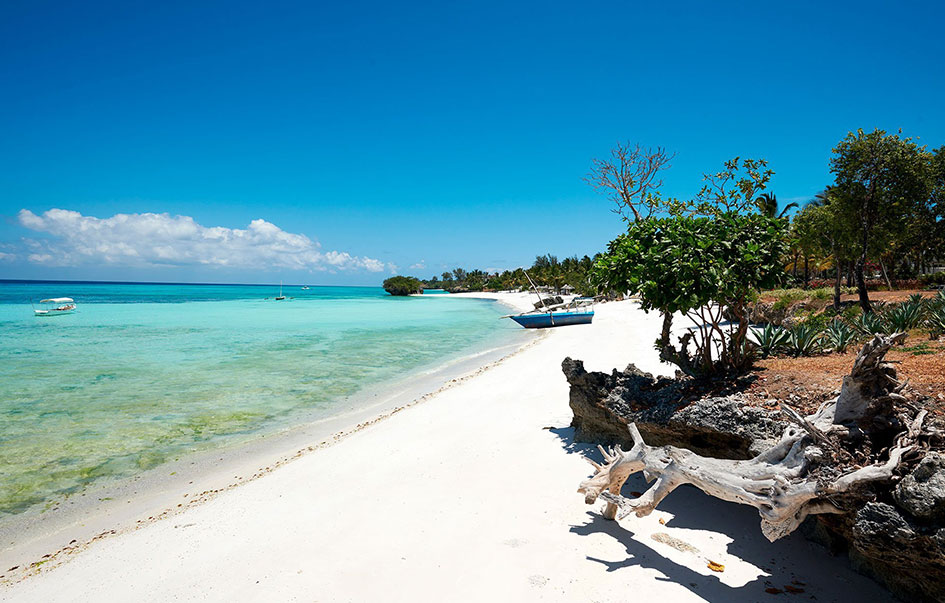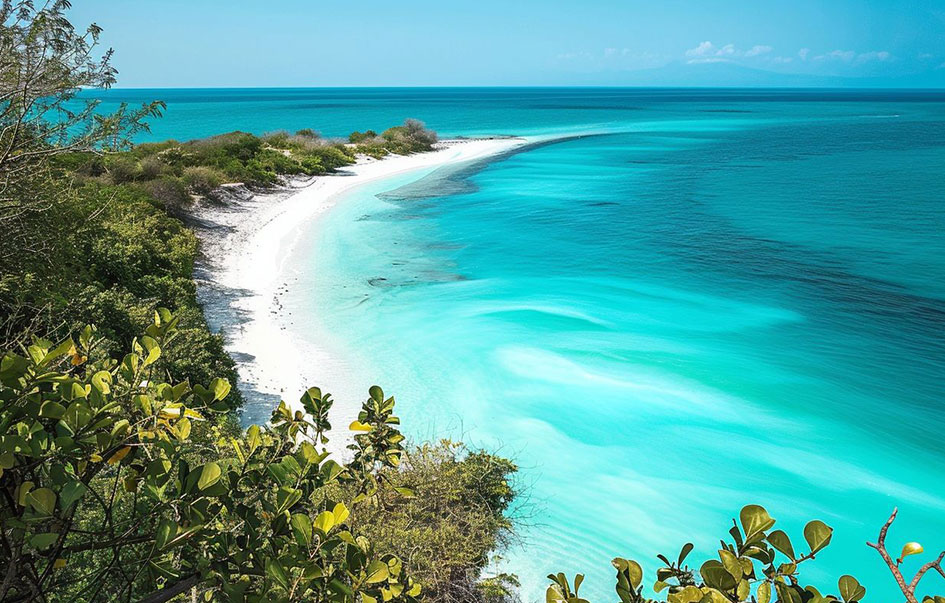Pemba Island


Drifting in the Indian Ocean, about 35 miles (56 kilometers) off the coast of East Africa, Pemba Island is a secluded paradise known for its pristine beaches, untouched natural beauty, and tranquil atmosphere.
As part of the Zanzibar Archipelago, Pemba offers a more peaceful and off-the-beaten-path experience compared to its more famous neighbor, Zanzibar.
A true haven for nature lovers, Pemba is home to lush forests, vibrant lagoons, and serene swamps, creating a rich and diverse ecosystem perfect for eco-tourism. Visitors can enjoy birdwatching, snorkeling along spectacular coral reefs, and exploring the island’s unique landscapes, each more captivating than the last.
Pemba is also famous for its fragrant spice plantations, producing cloves along with nutmeg and cinnamon. The island’s lush spice groves provide a sensory-rich experience, making it a must-visit destination for cultural and culinary explorers looking to immerse themselves in the sights, scents, and flavors of the Spice Islands.
For those seeking unspoiled beauty, rich biodiversity, and an authentic island escape, Pemba offers a truly unforgettable experience.
PEMBA FEATURES & HIGHLIGHTS
Pemba Island’s history stretches back over a millennium, making it an integral part of the Indian Ocean’s trading legacy.
As a thriving hub for Arab, Persian, and Indian merchants, the island played a crucial role in regional commerce and cultural exchange. In the 19th century, Pemba became part of the Sultanate of Zanzibar, cementing its status as a key player in the global spice trade, particularly in the cultivation of cloves. The island’s archaeological sites, such as Ras Mkumbuu and Ndagoni, stand as testaments to its rich cultural and commercial significance throughout history.
Pemba’s religious and cultural influence has been instrumental in shaping the history of Swahili Coast trade. This lush and fertile island, adorned with swamps, forests, and mangroves, is dotted with centuries-old ruins of mosques and tombs, slowly reclaimed by nature since the 17th century, when the Sultan of Oman took control of the island.
Beyond its historical sites, Pemba offers a rare opportunity to connect with local traditions that have been carefully preserved over generations. Visitors can engage with welcoming villagers, eager to share stories and embrace new company. A visit to Pemba’s bustling markets provides insight into local cuisine, with an array of fresh fruits, vegetables, and aromatic spices grown in the island’s fertile lands.
For history lovers and cultural explorers alike, Pemba Island offers an unparalleled journey into East Africa’s past, blending stunning natural beauty with deep-rooted traditions and historical intrigue.
The “Green Island,” surrounded by crystal-clear waters and beautiful coral reefs, is home to a diverse range of marine life, including colorful fish, sharks, and dolphins. Additionally, the island’s lush vegetation and on-land wildlife, such as bush babies, flying foxes, and vervet monkeys, are truly spectacular sights that should not be missed.
Gorgeous marine parks are nestled in the Pemba Canal Conservation Area, where many turtles breed here annually.
This conservation area is encircled by several smaller untouched islets that are said to be where some pirates, led by Captain Kidd, had hidden their treasure many years ago. Treasure that has yet to be found to this day.
This dense tropical forest remains largely untouched by human activity, making it a unique and pristine environment In the Zanzibar Archipelago.
This lush and vibrant forest is home to diverse wildlife, including African antelopes, Blue duikers, and Pemba flying foxes, among other fascinating animals. Moreover, the forest provides a haven for a multitude of bird species, adding to the vibrant and thriving ecosystem with their enchanting presence.
Boasting smooth, powdery white sands that adorn the beaches, Pemba Island offers the most picture-perfect scenery, with readily accessible coral reefs at low tide.
This is the place to be, with transparent glistening waters cascading down the beaches, especially when seeking a break from the busy urban life and an exclusive experience.
Some of the most stunning and, therefore, most frequented beaches are Misali Island white sand beach, Vumawimbi Beach and Fundu Lagoon beach.
Pemba Island’s history stretches back over a millennium, making it an integral part of the Indian Ocean’s trading legacy.
As a thriving hub for Arab, Persian, and Indian merchants, the island played a crucial role in regional commerce and cultural exchange. In the 19th century, Pemba became part of the Sultanate of Zanzibar, cementing its status as a key player in the global spice trade, particularly in the cultivation of cloves. The island’s archaeological sites, such as Ras Mkumbuu and Ndagoni, stand as testaments to its rich cultural and commercial significance throughout history.
Pemba’s religious and cultural influence has been instrumental in shaping the history of Swahili Coast trade. This lush and fertile island, adorned with swamps, forests, and mangroves, is dotted with centuries-old ruins of mosques and tombs, slowly reclaimed by nature since the 17th century, when the Sultan of Oman took control of the island.
Beyond its historical sites, Pemba offers a rare opportunity to connect with local traditions that have been carefully preserved over generations. Visitors can engage with welcoming villagers, eager to share stories and embrace new company. A visit to Pemba’s bustling markets provides insight into local cuisine, with an array of fresh fruits, vegetables, and aromatic spices grown in the island’s fertile lands.
For history lovers and cultural explorers alike, Pemba Island offers an unparalleled journey into East Africa’s past, blending stunning natural beauty with deep-rooted traditions and historical intrigue.
The “Green Island,” surrounded by crystal-clear waters and beautiful coral reefs, is home to a diverse range of marine life, including colorful fish, sharks, and dolphins. Additionally, the island’s lush vegetation and on-land wildlife, such as bush babies, flying foxes, and vervet monkeys, are truly spectacular sights that should not be missed.
Gorgeous marine parks are nestled in the Pemba Canal Conservation Area, where many turtles breed here annually.
This conservation area is encircled by several smaller untouched islets that are said to be where some pirates, led by Captain Kidd, had hidden their treasure many years ago. Treasure that has yet to be found to this day.
This dense tropical forest remains largely untouched by human activity, making it a unique and pristine environment In the Zanzibar Archipelago.
This lush and vibrant forest is home to diverse wildlife, including African antelopes, Blue duikers, and Pemba flying foxes, among other fascinating animals. Moreover, the forest provides a haven for a multitude of bird species, adding to the vibrant and thriving ecosystem with their enchanting presence.
Boasting smooth, powdery white sands that adorn the beaches, Pemba Island offers the most picture-perfect scenery, with readily accessible coral reefs at low tide.
This is the place to be, with transparent glistening waters cascading down the beaches, especially when seeking a break from the busy urban life and an exclusive experience.
Some of the most stunning and, therefore, most frequented beaches are Misali Island white sand beach, Vumawimbi Beach and Fundu Lagoon beach.

AREA ACTIVITIES
- Bask in the sunlight on Pemba’s immaculate sands.
- Enjoy Pemba’s finest water sport activities like diving, snorkeling, kite surfing and more.
- Delve into the enchanting world of underwater lodging, the Manta Resort.
- Going kayaking in these serene waters.
- Go swimming in the Chake Chake harbour.
- Explore the Ngezi forest.
WHEN TO VISIT
The ideal time to be at Pemba is any time from July to October or from mid-December to early March. You can expect it to be perfect because it has good weather and plenty of sun to soak up.


HOW TO GET THERE
- Flight: most flights to Pemba originate from or connect via Zanzibar. The flight from Zanzibar to Pemba takes approximately 20 minutes. Airlines serving Pemba Island include Flightlink, Zanair, Coastal Aviation, and Auric Air.
- Ferry: Pemba can also be accessed by taking a ferry from Stone Town, Dar-es-Salaam and Tanga. A popular ferry is Azam Marine, which promises a very comfortable and safe voyage.
